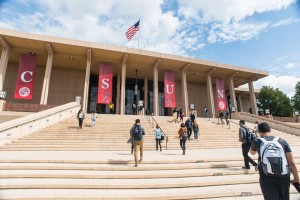

CSUN has launched a series of town hall meetings to explore what is student success. Photo by Lee Choo.
Just what defines student success? Graduation rates? Test scores? Retention? Time to graduation? Alumni earnings?
California State University, Northridge faculty, students and staff will grapple with that and other questions about academic life on the CSUN campus, during a series of monthly town hall meetings designed to break down barriers and start conversations about the meaning of higher education at the university.
Kristy Michaud, director of CSUN’s Office of Student Success Innovations and an associate professor of political science, said the recent launch by the CSU Chancellor’s Office of an initiative to improve student graduation rates by the year 2025 provides the catalyst for a thoughtful discussion about what defines student success.
“As we, as a campus, look at the new targets — increasing the number of students who graduate in four years and improving the graduation rates of traditionally underserved and low-income students — we need to have a discussion about what this shift to a performance-based approach to higher education means,” Michaud said. “This shift is happening not just in California, but across the United States. It doesn’t matter how many students you have or what kind of students you are enrolling. Now, what matters is how you serve those students.”
That, she said, leads to the need to explore the best ways to serve students.
“There are so many people who work with students, it’s not just faculty in the classroom,” she said. “There are staff members and administrators all over the campus, not just in academic affairs, who are all working on student success. But we don’t realize it, because we don’t speak the same language.
“It’s time we brought everyone, including students, together to start talking about what we’re doing, how we can work together better and to take a close look at where we can improve,” she continued.
The first meeting took place Friday, Sept. 30, and the next is scheduled for Friday, Oct. 28. The town halls feature representatives from across the campus and are facilitated by campus leaders, including Yi Li, CSUN’s provost and vice president for academic affairs.
“We are hoping to provide an environment where we can ask ourselves hard questions about what we are doing as educators, and how we can improve our impact on our students,” Michaud said.
For more information about the town halls, visit www.csun.edu/ossi.